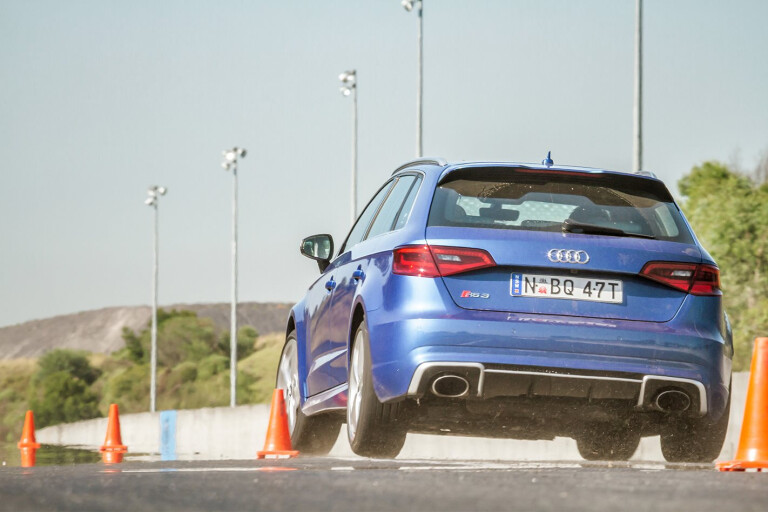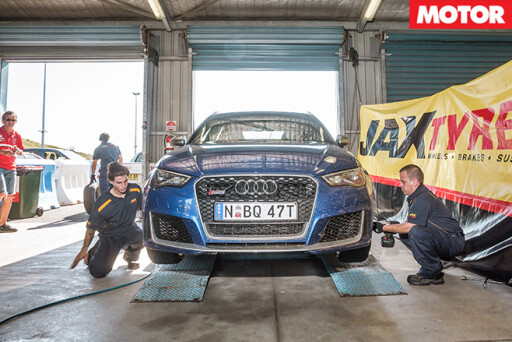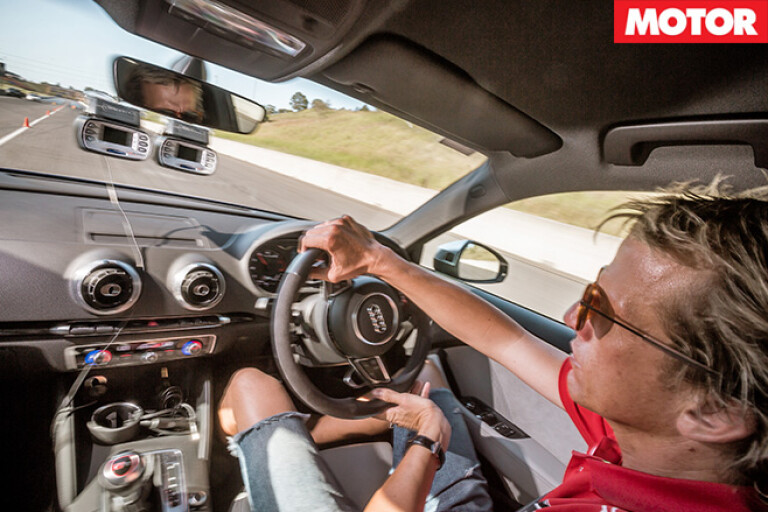
Cone-weaving – or slalom by its more technical name – is a classic tyre test exercise (and exercise run during almost any performance driving course you care to mention).
Going against the stopwatch is fun, of course, though it’s also a stern test of a car’s ability to swerve and recover in the case of something suddenly coming into your path, such as the classic kid-chasing-a-soccer-ball-onto-the-street situation.
We’re not here to test the Audi RS3, but Luffy says the Audi is so well balanced it provides the perfect platform for our first challenge of our 10 tyre models’ construction, as their sidewalls and shoulders are subjected to deformation with multiple aggressive changes of direction.

Luffy rolls through a start-gate at 50km/h then negotiates nine equally-spaced cones before triggering the Driftbox again at the finish point.
As with all the following tests, our aim is to eliminate as many variables as possible. So the Audi RS3 remains in second gear to wipe out any differences in shift times. Electronic stability control and traction control are also switched off.
 Five runs are recorded on each set of tyres, with the best and worst results deleted and an average time for the remaining three results going into the notes. The first run on the control tyre points to 10 seconds as an approximate marker for the test.
Five runs are recorded on each set of tyres, with the best and worst results deleted and an average time for the remaining three results going into the notes. The first run on the control tyre points to 10 seconds as an approximate marker for the test.
Just the name of Hankook’s Ventus S1 Evo2 creates certain expectations, yet the Korean tyre-maker recorded 10.0sec exactly to place third and leave Luffy summing up the MOTOR team’s thoughts on the brand that triumphed in the 2014 Tyre Test. “It’s noticeable how much the Hankook range continues to improve,” he said.
Indeed, its scalps in the slalom included the big names of Pirelli, Goodyear and Continental. Korea’s other representative here didn’t fare so well – second last. “In the slalom on the Nexens, the back of the car really starts to move around a lot, and that ultimately dictates the speed you can carry through there,” Luffy noted.

Michelin was one of only two tyres to break the 10.0sec barrier, though it was Dunlop’s Sport Maxx RT that was a further two-tenths clear to lay down an early benchmark in the slalom exercise.
DRY SLALOM RESULTS
| Rank | Tyre | Time(secs) |
| 1 | DUNLOP SPORT MAXX RT | 9.70 |
| 2 | MICHELIN PILOT SUPER SPORT | 9.90 |
| 3 | HANKOOK VENTUS S1 EVO2 | 10.00 |
| 4 | PIRELLI P ZERO | 10.03 |
| =5 | GOODYEAR EAGLE F1 ASYMMETRIC 3 | 10.10 |
| =5 | CONTINENTAL CONTISPORTCONTACT 5P | 10.10 |
| 7 | TOYO PROXES T1 SPORT | 10.13 |
| 8 | NITTO INVO | 10.30 |
| 9 | NEXEN N FERA SU1 | 10.53 |
| 10 | HIFLY HF805 CHALLENGER | 10.63 |
MORE MOTOR TYRE TEST 2016
 MOTOR TYRE TEST 2016
MOTOR TYRE TEST 2016
Finding the best high performance tyre in Australia
 DRY BRAKING
DRY BRAKING
It’s probably best the Sydney Dragway grandstands were empty during our testing, avoiding mass head-scratching as a car tried to do the opposite of the traditional action and slow as quickly as possible.
 MOTOR TYRE TESTS
MOTOR TYRE TESTS
The quest to find the best high performance tyres in Australia.



COMMENTS